Media reports regarding Secretary of State Hillary Clinton's visit to the Democratic Republic of Congo have so far focused on her testy remark to a Congolese student at a town hall meeting in Kinshasa on August 10. This has been a colossal waste of time when the Congolese, especially women and children, are watching the sand run out of the hourglass. A very important interview has been overlooked. In a separate interview, Jaldeep Katwala of Radio Okapi asked the important questions about human rights, the push by China for infrastructure contracts, and the continuing corruption in the government of Joseph Kabila.
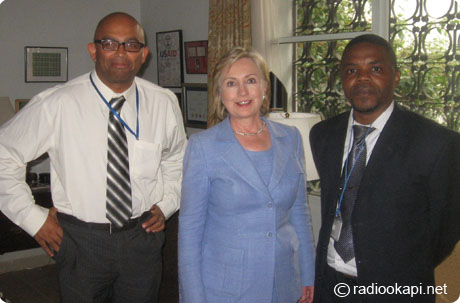
Image: Hillary Clinton with Jaldeep Katwala and Jean Claude Ntumba. Photo by radiookapi.net
(Inaudible) making the problem worse?
Secretary Clinton: Well, it's interesting because I'm aware of the commitment that China has made, and I think that building roads is a very important development goal for this country. But so is good governance. So is protecting and promoting human rights. So is building an independent judiciary, a free press, the institutions of democracy that will hold up over time. It's important to build a free market, to stand against corruption, to ask for more transparency, and the United States has been working to achieve those goals.
It's not either/or, and I'm aware that sometimes people can see the road more than they can see the protection for human rights. But you can have a country with roads that still deprives its people of human rights, that still has no economic development, so that there are no goods and services going down those roads that will actually help the people. So I think it has to be a comprehensive effort, and I believe the United States, with our help in education and health, is playing a very important role. And we are here to determine what else we could do.
What will you be saying to President Kabila tomorrow?
Secretary Clinton: Well, I'll be saying pretty much what I have said both at the town hall and in this interview, that President Obama would like to forge a new chapter in the relationship between the Congolese people and the American people, that I'm here to explore ways that we could work together, but that we believe strongly there must be an end to impunity, an end to corruption, more transparency and accountability; that the mineral and other natural resource riches of this country should be used for the benefit of the Congolese people, not for a very small group that have historically benefitted, not just for outside corporations or countries that extract the riches and leave with them without really putting back the commensurate investment in the country. And we think there's a lot of areas where we could be helpful, and we're going to explore whether that's possible.
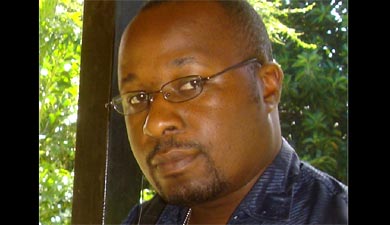
Image: Murdered journalist Serge Maheshe
Radio Okapi is a nationwide radio network set up to aid the peace process in Congo after the 1998-2003 war. Although there is plenty of criticism to go around regarding the military arm of MONUC, the journalists at Radio Okapi are doing an incredible job. One of them, Serge Maheshe, a broadcaster since 2002, was shot in June 2007 by militia in the South Kivu provincial capital of Bukavu. I was lucky enough to have met him. He had a wife and two children. With a reputation for integrity and professionalism, Maheshe was one of the main media personalities in the Bukavu region. Radio Okapi is a joint project with the Swiss Hirondelle Foundation and the United Nations Mission in the Democratic Republic of Congo (MONUC).
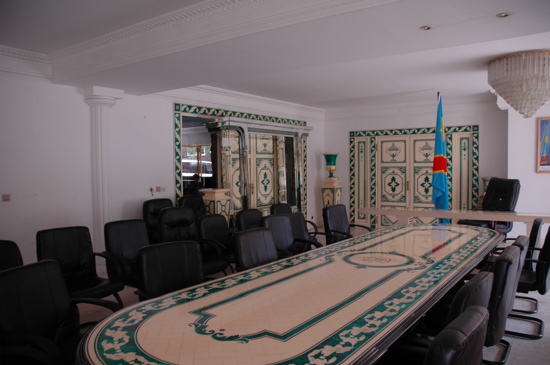 Image: Mobutu's Former "Mansion" in Goma
Image: Mobutu's Former "Mansion" in Goma
Early reports today regarding Secretary Clinton's conversations with Joseph Kabila in his tent behind the mansion of Former Dictator Mobutu Sese Seko in Goma are somewhat at odds.
Matthew Lee of the Associated Press made it sound as if Clinton would stand toe-to-toe with Kabila, who has been severely criticized for human rights violations.
Clinton called the statistics "astonishing and horrible" and said "the entire society needs to be speaking out against this. It should be a mark of shame anywhere, in any country."
"We have to speak out against the impunity of those in positions of authority who either commit these crimes or condone it," she said.
She added that the United States would support U.N. Secretary-General Ban Ki-moon in his call for global action to stop government forces and armed groups from using sexual violence as a tool of warfare.
Meanwhile, Uganda feeling snubbed that Clinton is not stopping there, ran an editorial in the Ugandan Independent by Joe Powell that pretty much sums up independent journalists' feelings (including myself) regarding the reporting of the New York Times on this humanitarian, political, and moral crisis. Powell attacks the cliches about Congo present in Western media.
The Hillary Clinton show arrives in Goma today, where she will meet with President Kabila and visit a hospital in the city. The DR Congo is a country that has long suffered from cliched Western reporting and that is the topic for blogger 'Texas in Africa', who predicts what New York Times East Africa Correspondent Jeffrey Gettleman will report about the Clinton visit to Goma:'That we are unlikely to hear anything new out of Goma means that we are very likely to see a redux of the same stale article the New York Times has been running for several years now. And of what exactly will that article consist? I'll wager a guess: Goma is dangerous; Clinton's staff didn't want her to go, and the scenery under the smoking volcano is spectacular; 5 million people have died in this under-reported, forgotten tragedy that's on the front page of the NYT at least once every eight weeks and where the largest peacekeeping force in the world spends lots of money and 17,000 troops struggle to control the vast territory, which is [either] the size of Western Europe [or] the size of the U.S. east of the Mississippi. Lots of women have been raped in the Congo. Now they're raping men, too! It's the Heart of Darkness.'
The New York Times, in an article by Gettleman, announced Clinton's commitment of $17 million to fight sexual violence. Gettleman was the same reporter who described human rights violator Kabila as "a shy man with a warm, almost Caribbean lilt to his voice and a convincing, unpretentious air." The Caribbean lilt thing does not fit with a man Human Rights Watch has accused of crushing his political opponents through an orchestrated campaign of political persecution which includes torture.
I am not satisfied with Gettleman's coverage and join my voice with that of the Texas blogger. It does not serve readership or the truth to paraphrase the Secretary of State, when direct quotes would do a much better job of conveying her tone and intent. Does the man not own a digital recorder? Read the NYT coverage here and an excerpt follows. Decide for yourself.
Mrs. Clinton came here, she said, to shine a light on the civilian deaths and endemic sexual violence, and to call on the government of Congo, whose own soldiers have been implicated in many of the abuses, to do a better job of protecting its own people... She also said she had pressed Mr. Kabila to ensure the prosecution of five senior officers in the Congolese military who have recently been accused of rape. Congo's army is notoriously undisciplined, but Mrs. Clinton said that she believed that with training and regular, adequate pay, their behavior could improve.
"We are very concerned about civilian casualties: deaths and rapes and other injuries from military action," she said at a news conference at the governor's mansion here along the shores of Lake Kivu after a meeting with President Joseph Kabila and other officials...
Mrs. Clinton spoke about what she called "conflict minerals" and said that the world must do more to keep profits from them "from ending up in the hands of those who fuel the violence."
She also said she had pressed Mr. Kabila to ensure the prosecution of five senior officers in the Congolese military who have recently been accused of rape. Congo's army is notoriously undisciplined, but Mrs. Clinton said that she believed that with training and regular, adequate pay, their behavior could improve.
The NYT article went on to describe Clinton's "entourage," which is not a fair way to describe the security that had to be in place. I can say this with certainty, having been to the Mugunga II Camp, less than 1 kilometer from Mugunga I, in January.
I don't know about you, but I think Radio Okapi did the best job of the three reports.
Regarding the international press sniping about Clinton's response to a poorly translated question at the town hall meeting in Kinshasa, I get it and more. Travel in Africa is difficult and trying, but travel in Congo is beyond belief. Word is that she had to fight to be allowed to take what are basically unsafe in-country flights from Kinshasa to Goma and back. Most of us who have worked there avoid those flights like the plague. Add the generally imperious nature of officials there, combined with jetlag and the horrors she has been witnessing all over the continent, it is no wonder she politely snapped a very curt answer to what appeared to be a very stupid question about her husband.
Lord knows, I have been known to chew the heads off of my traveling companions for not staying focused. Travel with me in Congo at your peril. My usually sunny disposition goes up in smoke pretty quickly. I blame my anti-malarial medication, but I have no idea whether the Secretary was taking any precautions. One would assume, though, that she was. Malaria prophylactics are notorious for inducing lack of sleep and fiery tempers.
I think it was good she was feisty. I am hoping that she flashed the same temper to Kabila because of his complete and utter failure at protecting the people of Congo.
Oh, and one more thing that really bugged me about the AP coverage. The wire report mentioned the "Mugunga" camp, and it was important for me to know which of the three Mugunga Camps Clinton visited. After visiting Mugunga II in January, the memories of the people I met there are like a tattoo. To paraphrase Lucinda Williams, they pierce the mind and the blood runs through. While the State Department was trying to clarify the location for me (it was Mugunga I), I contacted Gettleman's co-writer Sharon Otterman in New York. He was there and I thought she would know. She was very polite and I am truly not picking on her, but when I suggested it was important to know WHICH camp, she nicely offered that it did not matter since they were all the same. I am sure she did not mean that the way it sounded and I blame the reporter on the ground for not being specific in his reportage to her.
Of course it matters. It matters greatly.
This is the kind of filter that is the cliche that the Ugandan Press was griping about. All of the camps are not the same anymore than any town or city in the United States is "the same" as another. There are individual life histories and families torn apart for many, many reasons. Every story is different, unique, and deserves to be heard in its individual context. I feel like I am a member of the Mugunga II camp. I wanted to know if Clinton saw what I witnessed there.
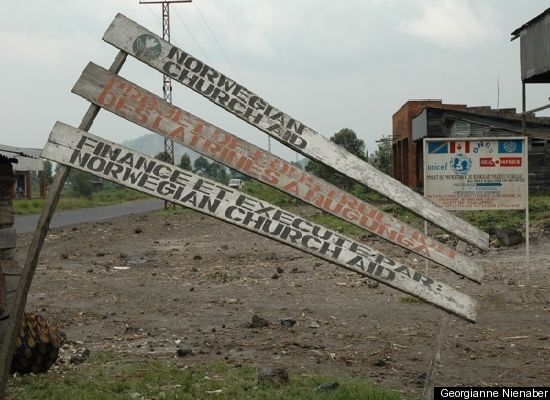 Image: Road to Mugunga II Copyright © Nienaber
Image: Road to Mugunga II Copyright © Nienaber
Imagine if the press covered a hurricane in Miami and reported it as Fort Lauderdale, saying "oh well, all Florida cities are the same." The reporter would be fired and the newspaper would be engulfed in scandal and fold. Or, imagine if you went to the local photographer at Sears and had your baby's portrait taken. The photographer mixed up the names and sent you the wrong portfolio, saying "well, all babies look alike."
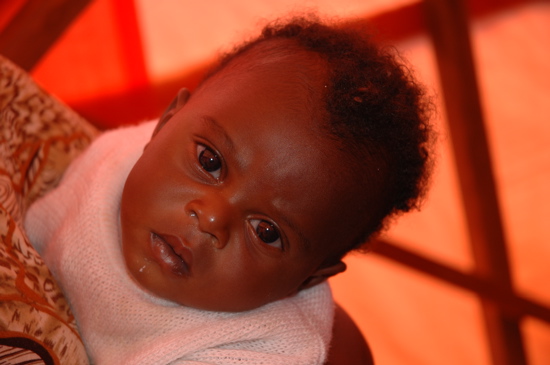
Image: Baby Who Lived at Mugunga II in January 2009
We owe Africa the same kind of attention to detail and accuracy in reporting. There is a certain sloppiness that happens in reports from Africa, and we can all do better.
As far as the $17 million for rape victims? We need to make sure that most of it does not go to Kabila's motorcycle collection. The State Department says it will issue a report soon on how the money is to be managed. $73,000,000 in USAID funding is vanishing into a program called the Central African Regional Program for the Environment (CARPE) with little or no accountability from conservation organizations. This does not take into account the over $1 billion allocated by USAID alone for Africa.
I was told the State Department comments on the funding will show up here. Keep checking.
